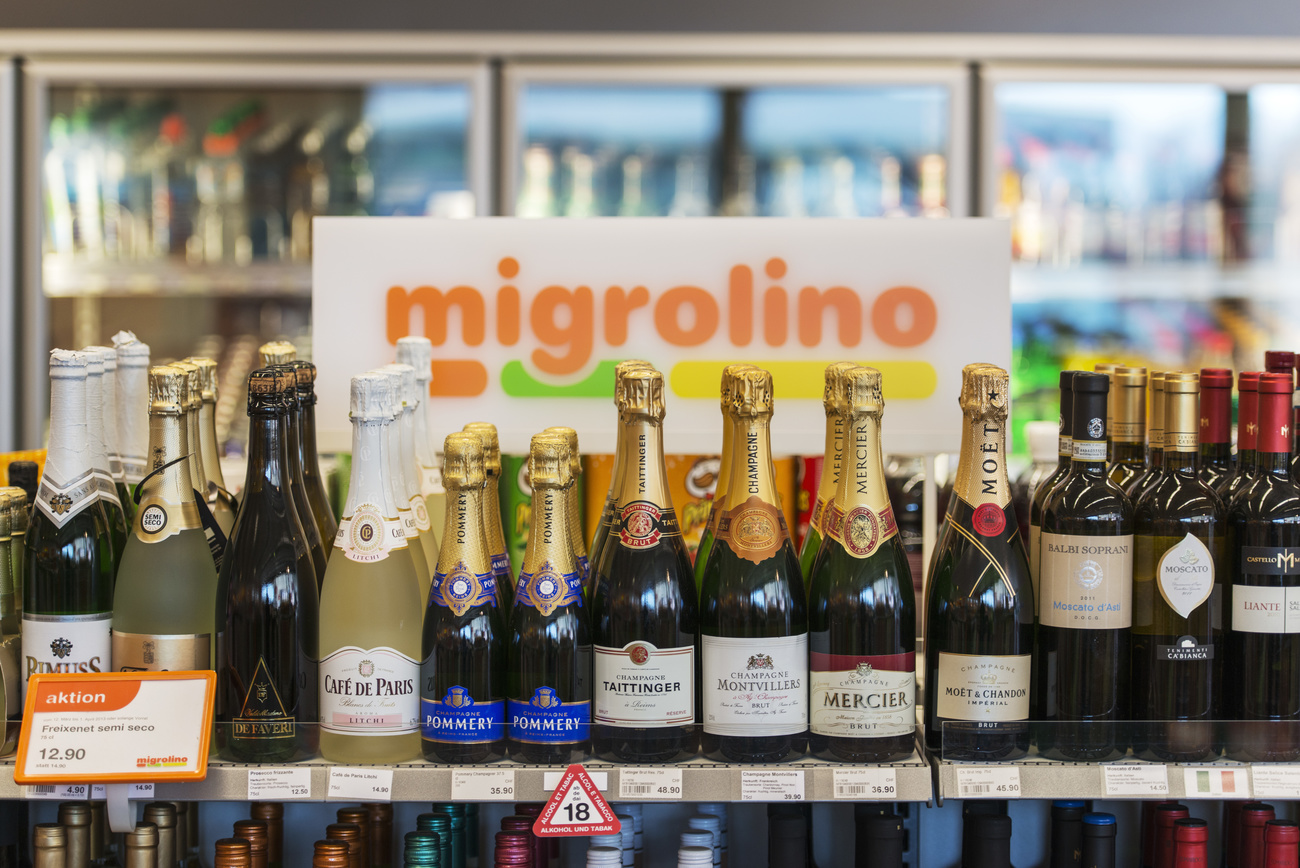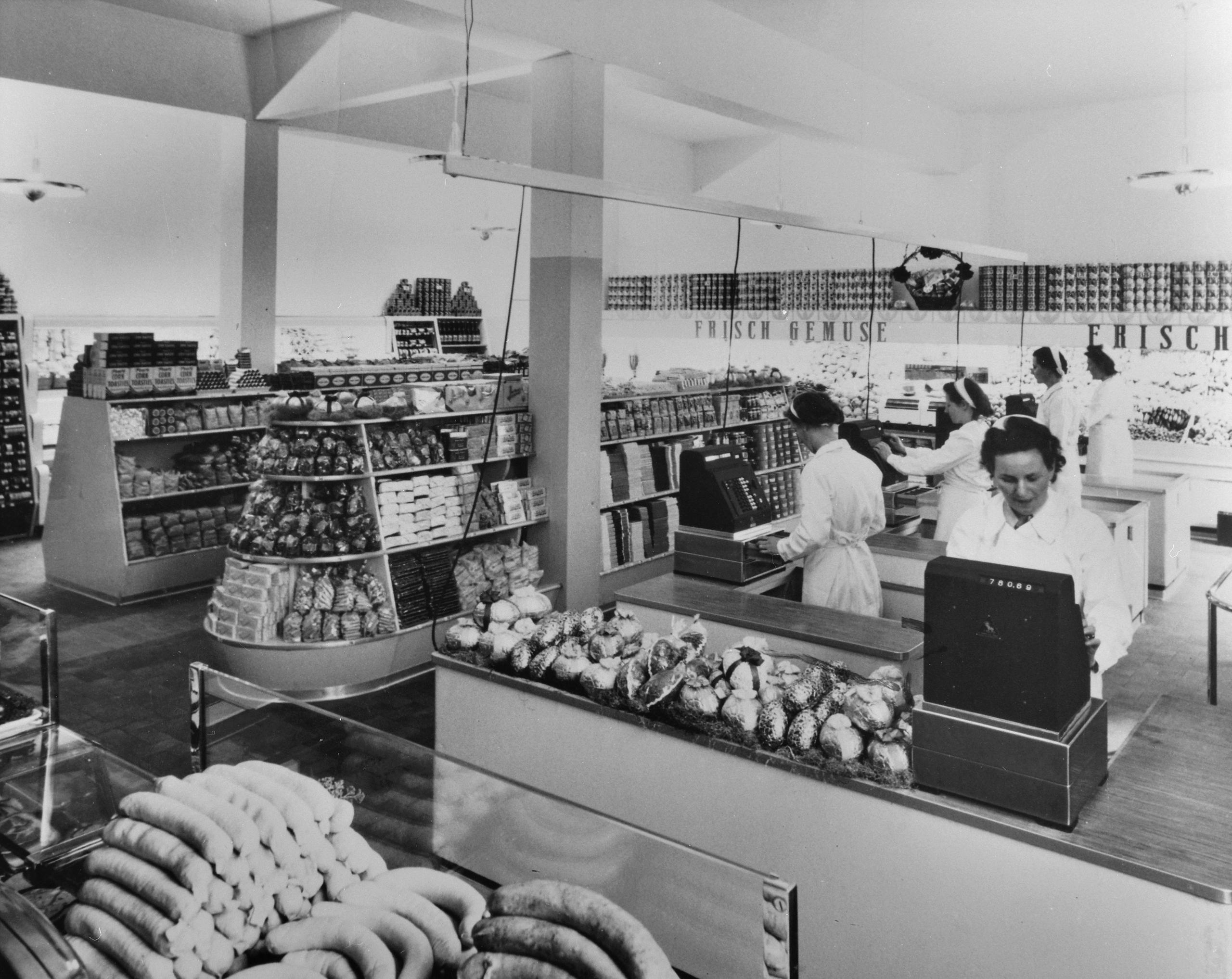
Retail giant Migros confronts its complicated history with alcohol

The recent announcement that Migros is considering selling alcohol in its supermarkets, after almost a century of abstinence, has left many people needing a stiff fruit juice. Here’s a look at a teetotal tale of principles, profits – and accusations of hypocrisy.
How many tourists or newly arrived expats have wandered around one of Switzerland’s 630 Migros supermarkets in search of a beer or a bottle of wine before eventually being put out of their misery by an employee?
Shoppers from Europe, especially Britain, might be mildly shocked to hear that one of the country’s most successful and most popular retailers doesn’t stock alcohol or tobacco.
However, last Saturday Migros took the first step towards offering alcohol (but not tobacco), when 85 of the company’s 111 delegates voted in favourExternal link of amending the company’s statutes to lift the ban on booze. This cleared the democratic path, as Migros put it, to letting the ten regional cooperative committees vote on the issue next month. If they back the amendment, it will go to Migros’ 2.27 million members – a quarter of the country – on June 4.
The regions where two-thirds of members give the thumbs up will then be able to start stocking their shelves with alcohol.
With sales of CHF29.9 billion (2020), the Migros Group is the largest retailer in Switzerland, and with around 99,000 employees (59% women), it is the country’s largest private-sector employer.
Migros is owned by its 2.27 million cooperative members and is organised into ten regional cooperativesExternal link. These cooperatives operate the core business of the Migros Group: retailing. Migros also owns numerous industrial companies, various commercial, travel and logistics enterprises, as well as Migros Bank.
The ten regional cooperatives are the very foundation of Migros. They are independently managed, issue their own annual financial statements and control their own sales areas and staff in the core business: retailing under the Migros name. Their most important functions are the sale of merchandise and the purchasing of regional product ranges, while the Federation of Migros Cooperatives (FMC) takes care of central services such as purchasing, logistics and IT.
The FMC owns five market-leading companies. These include the discounter Denner, convenience specialist migrolino, and petrol station operator and oil supplier Migrol. With Digitec Galaxus, Migros also owns the largest e-commerce player in Switzerland, while Ex Libris is the country’s leading online bookseller.
In 2020 Migros Culture Percentage spent CHF142 million on culture, society, education, leisure and the economy.
(Source: Migros, Facts & Figures 2020)
If it comes to a vote in June, the debate over the next six months or so promises to be spirited. In the run-up to the delegates’ meeting, the Blue Cross, an NGO engaged in the prevention and treatment of alcohol and drug dependency, warned of a “betrayal” of Migros’ DNA. The company risked losing its good reputation as a socially responsible major retailer, Blue Cross said.
Unique selling point
This reputation has been built up over almost a century. In 1925 visionary Swiss entrepreneur Gottlieb Duttweiler (1888-1962) sent five converted vans onto the streets of Zurich to sell basic foodstuffs. The following year Migros opened its first store in Zurich.

More
Migros celebrates 75 years
In 1928 Duttweiler bought a struggling fruit juice factory on Lake Zurich as a new production centre and continued the previous owner’s commitment to promoting public health.
“If we’d introduced wine when Migros came along, the price would have been about 58 cents a litre. That was a real danger! Many people would have started drinking or would have drunk more,” he said in an interview in the 1950s, reported by the NZZ am SonntagExternal link.
However, it wasn’t all ideology – Duttweiler, after all, loved a drink and a smoke. Buying the factory had put him in debt and he needed money. He gambled on cheap fruit juice, and it paid off. The public couldn’t get enough of it.
Duttweiler wasn’t always convinced by a ban on alcohol, according to the NZZ am Sonntag. Years later, when alcohol prices were higher and excess wine was becoming a problem, he said he proposed stocking local wines as part of a campaign to promote consumption and was “almost stoned to death” by the cooperative council.
He added, however, that in principle he was still against selling wine: “When you’ve upheld a principle for 27 years . . . you shouldn’t give it up for opportunistic reasons.”
For marketing expert Thomas Wildberger, who was behind the group’s “Migros belongs to the people” campaign, “the renunciation of selling alcohol has always been a fundamental pillar of the company. It’s one of the most important criteria that set it apart from the competition”.
“This unique selling point has made Migros popular,” he told the Tages-AnzeigerExternal link. “Now it seems that this is being abandoned. That’s a pity, because the public loves Migros precisely for this difference.”

More
How a new kind of Swiss store changed the way we shop
Aisles of ales?
The reason that Migros is developing a taste for alcohol is “clearly economic”, according to Le TempsExternal link.
“Migros is currently missing out on a significant chunk of the market,” it said, pointing out that every year the average Swiss puts away 52 litres of beer, 31 litres of wine and 3.8 litres of spirits, including in bars and restaurants.
“The retail sector earned CHF2.6 billion ($2.8 billion) from these drinks in 2020. In other words, one franc in 11 earned by Coop, Aldi, Lidl, Manor or Denner comes from the sale of beer, wine or spirits. That’s half as much as meat, but 1.5 times as much as fruit,” it said.
Given that Migros has a 35-40% share of the food market in Switzerland, “this historic shift could increase its turnover by at least CHF900 million a year”, Le Temps calculated.
Migros’ former chief financial officer Mario Bonorand is even more optimistic, putting the figure at CHF1.5-2 billion.
‘Hypocritical’
The reality, however, is that Migros has been selling alcohol for years, just not in supermarkets.
“It’s understandable that Migros also wants to make a profit from this controversial business. But why doesn’t it admit to it?” tabloid Blicksaid last yearExternal link. “Instead, concepts like ‘VOI-Migros-Partner’ are invented and franchise concepts are developed. Just so Migros can claim that it doesn’t run a single shop itself. That is hypocritical.”
The Migros group currently offers alcohol, and in some cases tobacco products, in its subsidiaries Denner and migrolino, its internet outlet leshop.ch, the Migrol petrol stations and the partner shops VOI.
When the deal with discount chain Denner was announced in 2007, industry observers praised it as a perfect fit for both parties as it married the size of Migros with Denner’s alcohol and cigarette products.
What’s more, the debate isn’t new, going back to 1997 at least, when Migros bought high-end department store Globus (which it sold last year).
“The tug-of-war between a new generation of managers and a kind of old guard, made up of disciples of Gottlieb Duttweiler, was clear to see,” Le Temps saidExternal link of the Globus purchase. “At the time people criticised the entry of alcohol and tobacco through the back door. There was talk of a violation of the cooperative’s statutes. It was said Migros’ historic principles had been cut up.”
Swiss democracy
For many – perhaps most – people, selling alcohol is indeed a question of principle. For some, however, it poses very real challenges.
Swiss public radio, SRF, spoke to FelixExternal link, a recovering alcoholic who has been sober for several years. He said that for people with an addiction, shopping can be like “running the gauntlet”. He finds it especially difficult to walk past alcohol in a shop.
“It just triggers you. You might think about buying something again. Or you should take advantage of a special offer,” he said. “You just want to avoid situations like that.”
If the alcohol isn’t there, he’s less likely to buy it and relapse. “It’s a different shopping experience, especially in the early days when I got sober. I had to be careful where I walked and where I didn’t. It was targeted shopping,” he said, explaining that he would write a shopping list so he could deliberately avoid certain sections.
“Duttweiler would be spinning in his grave,” concluded an editorialExternal link in the Tages-Anzeiger. “Or perhaps not. He rarely did what others expected of him.”
So who will be cracking open the champagne – or lemonade – next year? Whatever happens, marketing expert Thomas Wildberger says it’s smart to let the 2.27 million Migros members have the final say.
“As a democratic country, we’re used to such votes and we accept the result – no matter what it is. It will be no different in this case.”
More

In compliance with the JTI standards
More: SWI swissinfo.ch certified by the Journalism Trust Initiative






























You can find an overview of ongoing debates with our journalists here . Please join us!
If you want to start a conversation about a topic raised in this article or want to report factual errors, email us at english@swissinfo.ch.